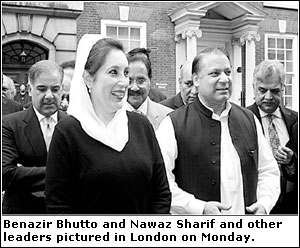

On May 15th, 2006, the chairperson of Pakistan People’s Party (PPP) Ms. Benazir Bhutto and chairman of Pakistan Muslim league (N) Mr. Mohammad Nawaz Sharif jointly signed on Charter of democracy in London, the major objectives so carried by that charter is as follows;
1)The structure of the constitution of 1973 should be revived exactly as it was till October 1999.
2)Both parties will not do any deal with the running party or mercenaries, so as to win the elections.
3)The judiciary, law and election commission shall be made neutral.
4)If any party wins the elections then it will not torment opposition, but instead it will invite opposition in offering suggestions in political, social, economic, regional and international affairs. And none of decisions shall be made that will go against the mind of the parliament. And the same liability is for the opposition that it will also not anguish government like what traditionally it is used to doing.
5) LFO shall be revoked, and the principles, which say that minimum age of voters should be 18 years, women are permissible to be the parliament member, and seats of parliament can be increased shall be remain unaltered or unmodified.
6)Genial relations shall be establish between civil administration and military.
This Charter of Democracy, however, addresses all expected issues and has no clauses that raise the question of its justification for being. Therefore, everything that is stated in the subjective charter is regarded as being absolutely necessary for the establishment of democracy, including the powers of the premier, the restoration of the roles of the federation and the provinces, press freedom, good relations with neighboring countries, pledges to fight corruption, assurances that the elected government will not be opposed, and disclosures of the personal assets of military and civilian officers and members. Thus, either directly or indirectly, this agreement has all the elements required for effective governance.
Because it placed focus solely on the technical concerns, the prologue to the Charter makes it very evident that both sides’ attorneys produced it. It neither presented any policy that may improve the current political climate nor did it talk about any kind of contribution or set adjustment for subsequent elections. In addition, it hasn’t allocated any procedures or techniques to control or prevent the traditional election fraud that is widely anticipated.
Not only that, but the paper also omitted the correct timeline for the arrival of the two opposition leaders in Pakistan. But Ms. Benazeer Bhutto revealed the timing of her visit to the media because, in her words, her party has advised that the upcoming month of November would be appropriate for her entrance since the running assemblies won’t have finished their term of operation by then.
However, neither the subjective charter nor the combined news conference mentions when or how Mian Sahab will get here. However, there is important information that is circulating in the political environment that Mr. Nawaz Sharif is currently seeking the legitimacy of Saudi King Abdullah Bin Abdul Aziz regarding his arrival to Pakistan. He is avoiding direct conversation and instead wants the Pakistani people or Ms. Benazeer to speak with the King in the event that they need to make preparations and arrangements for his arrival in a manner similar to how they did for his exemption or liberation in 1999–2000. King Abdullah is undoubtedly our true friend, and he will undoubtedly take the proper actions in this respect.
The fact that Ms. Bhutto will become prime minister if this political coalition wins the upcoming election is another item that is not explicitly stated in the charter but has received verbal approval. However, this assumption is also based on the idea that this will only be possible if the constitutional prohibition against becoming prime minister a third time is eliminated. And it is obvious to everyone who pays attention that such an amendment is unattainable absent an enduring partnership between President Musharraf and his government on national security issues. Or, we may claim that such a constitution simply cannot be adopted if the whole political system is governed by the military or is obligated to serve its interests. And if the PPP and PML-N are steadfast in their commitment to the charter’s tenet that they would not strike a deal with the current ruling class, then the government will undoubtedly invent strategies in an effort to prevail in this political conflict. And at that time, MMA will significantly cash out its earnings. It is quite evident that MMA leaders are silent experts at striking agreements with the establishment despite playing on the other side of the fence. A few weeks ago, Mr. Qazi Hussain Ahmed of the JUI visited Libya, and shortly after, on May 17, 2006, Mr. Shukat Aziz, the premier of Pakistan, visited Libya. As a result, it is safe to assume that both of these topics have come up in conversation with the Libyan government due to mediator connections.
Benazir and Nawaz Sharif are powerless to do anything other than criticize the President and his initiatives, I should probably say. As far as the issues of illiteracy, corruption, injustice, poverty, unemployment, etc. count, then on this behalf they haven’t got such a face to impugn the government, as their past record is worse than that of the current state of affairs. Additionally, both leaders support the current policies regarding Pak-India relations, and they had also attempted to implement those policies while they were in power. They also have no objections to the joint struggle for anti-terrorism.
Speaking about MMA, there is no restriction on chanting against the government, and therefore against the US, and that is what they are often expected to do. They have all the tools and resources necessary to incite religious feelings. They will be free to stir up Muslim anger regarding Indian violations in Kashmir, and they will also receive full government support in secret, just as they did during the 2002 elections in the NWFP and tribal areas.
Therefore, in light of these facts, if MMA succeeds in winning the same number of seats that they currently hold, similarly if the PML (Q) and its supporters win the same number of seats, and similarly if MQM succeeds in securing its fixed positions in the future elections, then obviously it will be totally impossible for any next party to achieve a 2/3rds majority in the parliament. As a result, once the party won’t succeed in getting the desired majority the party will fail.
But if we plan forward, it makes logical that Ms. Benazeer and Mian Nawaz Sharif would definitely run in the elections despite being unable to become the premier. And in light of this, President Musharraf and his supporting parties are in jeopardy because if these two powerful and well-known political figures are elected to the parliament, they will undoubtedly use their influence to persuade the other lawmakers to introduce a resolution to amend the constitution. So, let’s wait and see what the President has planned to do about it. It’s possible that the President has instructed Qazi Hussain Ahmed to object at this time. In the event that Qazi Sahab generates a threat by amassing a few hundred thousand voters, it is conceivable that the western bloc, which consists of major powers, will end their mutual mistrust of President Musharraf and permit him to participate in the elections on his own. At that point, the likelihood of extending the voting period will increase. But if the commotion of the major powers continues, then the subjective protest will help to pave the path for new developments, and anything might happen at that point.
Writer is Student of Law College, University of Sargodha.





